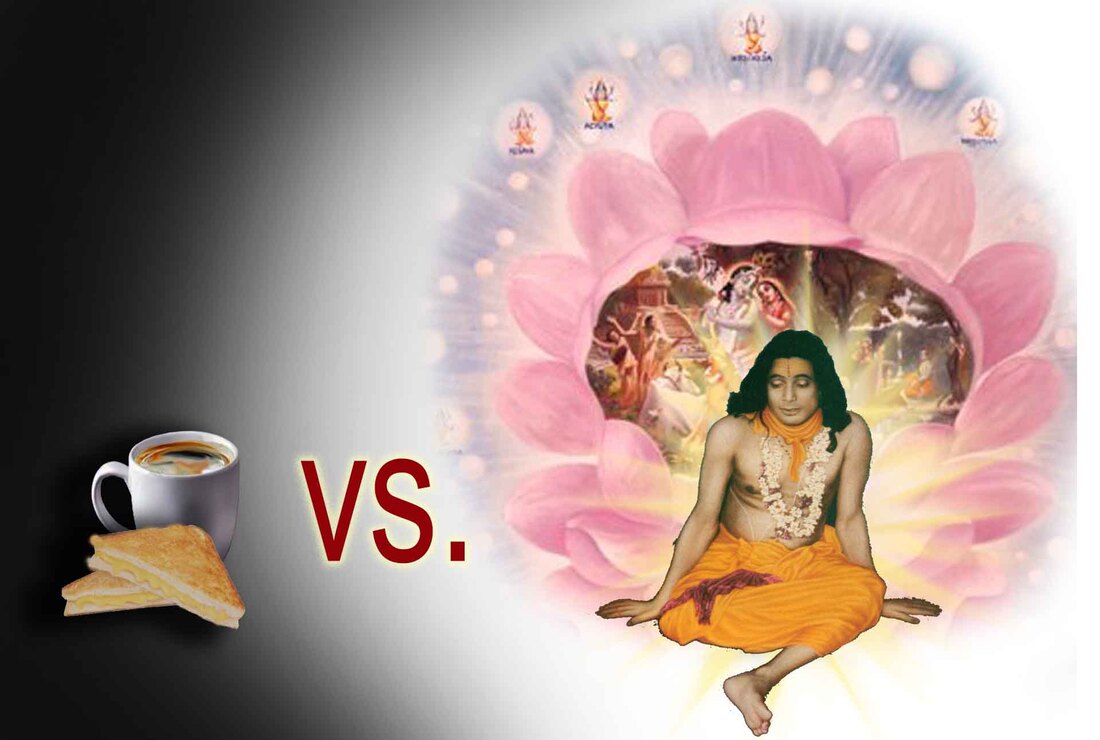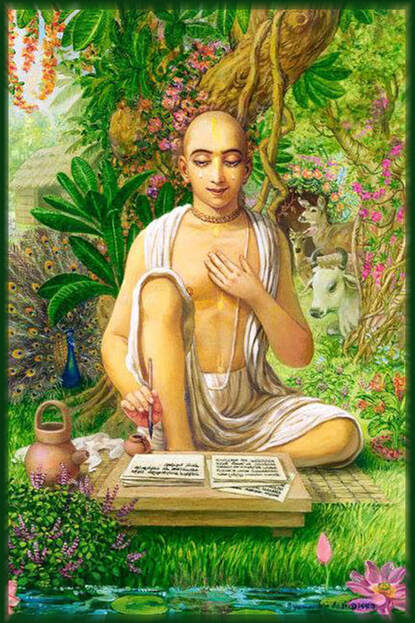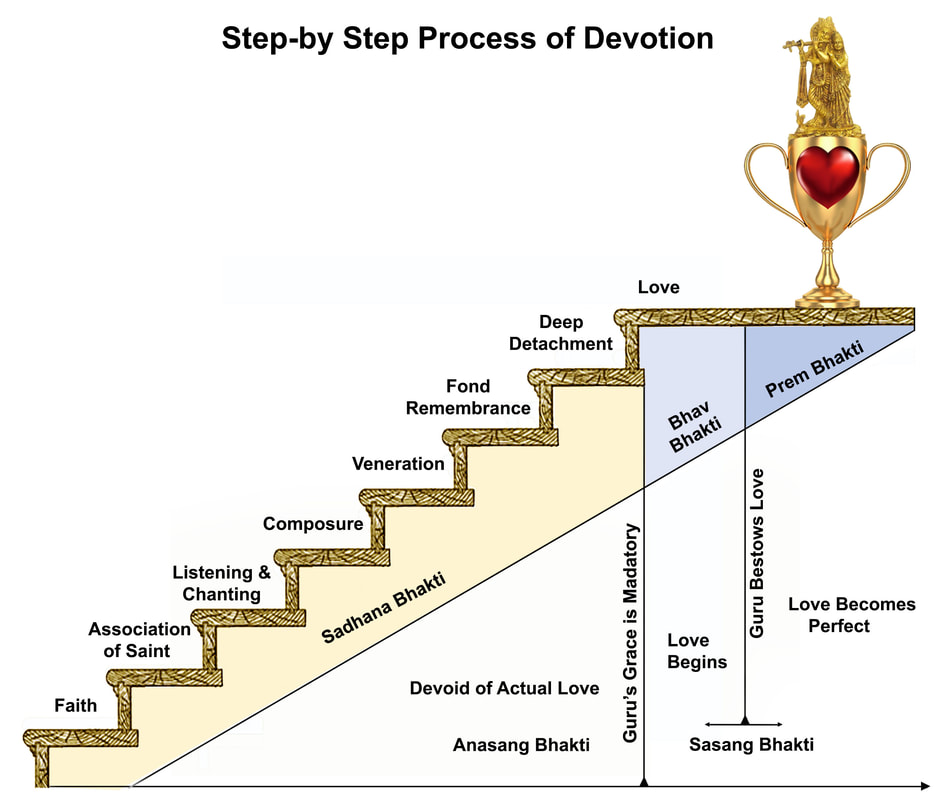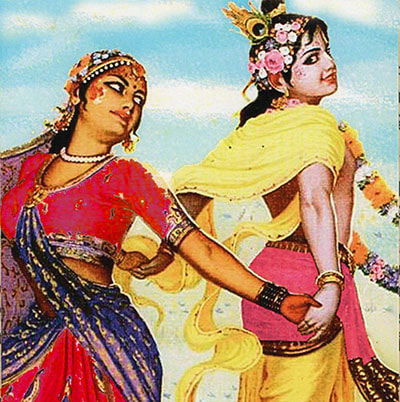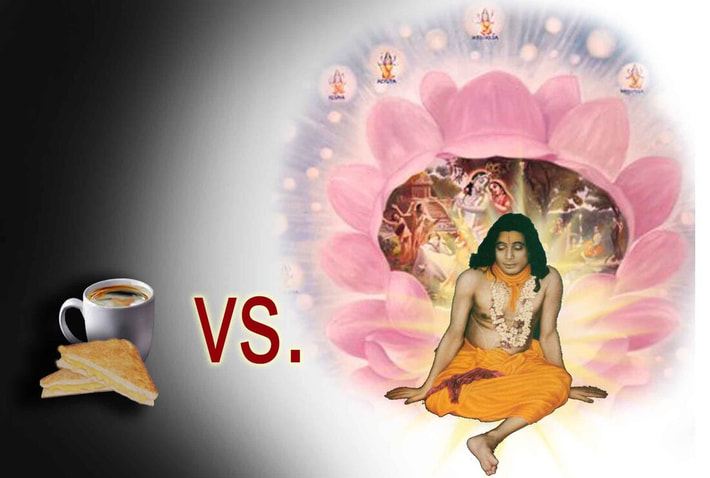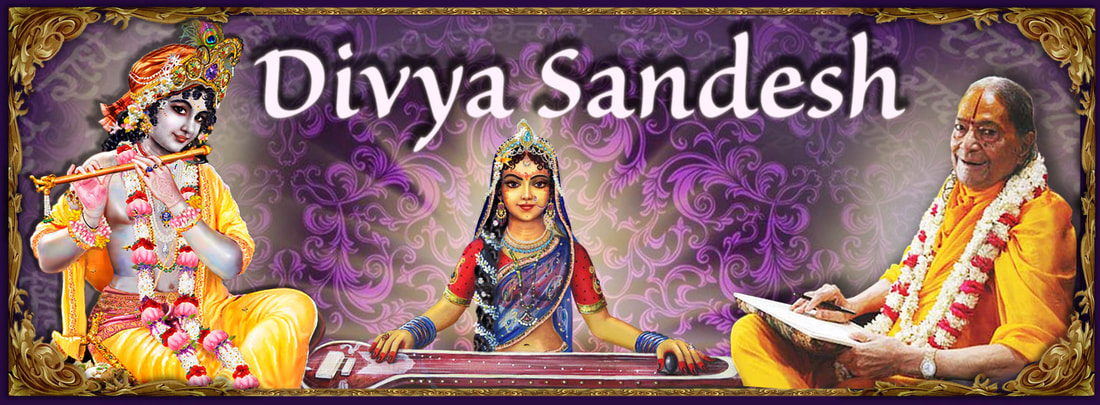2023 Guru Poornima |
|
Philosophy
Bhakti is Extremely Difficult-to-AttainWhy does Roop Goswami say that Bhakti cannot be attained by any means?
|
Kripalu Leelamritam
For your own good abandon your own agendasRead this Shri Maharaj Ji's Leela to understand how our desires harm us.
|
Kids Story
Who Do You Serve?A lesson in spirituality from Akbar and Birbal Story.
|
Philosophy
|
In Bhakti Rasamrit Sindhu, Roop Goswami wrote -
साघनौघैरनासंगैरलभ्या सुचिरादपि ।
हरिणा चाश्वदेयेति द्विधा सा अयात्सुदुर्लभा ॥ भक्तिरसामृतसिन्धु 1.1.35
sāghanaughairanāsaṃgairalabhyā sucirādapi।
hariṇā cāśvadeyeti dvidhā sā ayātsudurlabhā॥ bhaktirasāmṛtasindhu 1.1.35
“Bhakti cannot be attained by performing religious rituals even if one were to do them continuously for a long duration. Also, God hesitates to bestow Bhakti. Thus, bhakti is inaccessible for two reasons.”
It might shock you to know that Bhakti is inaccessible by any and all means. You might counter that by saying, “but so many people have attained it?” Yes it is unattainable by every means and yet countless souls have attained it. So is it accessible or inaccessible? How does one reconcile these seemingly contradictory statements? |
Before we answer that question, let us have a quick recap.
There are 18 levels of bliss[1]. Out of these the top most level is unattainable by jeev as it is a reserved seat of Shri Radha-Krishna. That leaves the rest of the 17 levels of bliss. Out of these, the bottom 11 are material bliss and Vedas state the Vedic karma to attain each of them.
There are no means to attain any of the levels above that. One has to engage the mind in remembrance of God, i.e do sadhana bhakti. We have explained in our previous articles that to attain any bliss of the divine realm one has to engage the mind to do bhakti. Each jeev has to do Sadhana for oneself. Saints, Guru or God cannot do this on our behalf or grant it to us.
There are 18 levels of bliss[1]. Out of these the top most level is unattainable by jeev as it is a reserved seat of Shri Radha-Krishna. That leaves the rest of the 17 levels of bliss. Out of these, the bottom 11 are material bliss and Vedas state the Vedic karma to attain each of them.
There are no means to attain any of the levels above that. One has to engage the mind in remembrance of God, i.e do sadhana bhakti. We have explained in our previous articles that to attain any bliss of the divine realm one has to engage the mind to do bhakti. Each jeev has to do Sadhana for oneself. Saints, Guru or God cannot do this on our behalf or grant it to us.
One can do 2 kinds of bhakti -
There are 3 increasingly higher levels of bhakti -
- Anasang bhakti (अनासंग) - Mind is focussing on worldly things and performing bhakti activities with karmendriyan, the physical sense organs.
- Sasang bhakti (सासंग) - Mind is focussing on God, karmendriyan and gyanendriyan may or may not be engaged in devotional activities.
There are 3 increasingly higher levels of bhakti -
- Sadhana Bhakti - This is the preparatory bhakti where one practices to focus one’s mind on God.
- Bhav bhakti - This is also preparatory devotion where one’s mind can easily focus on God.
- Siddha Bhakti - When bhav bhakti is perfected, the mind becomes 100% purified. Then Guru transforms the material mind into a divine mind and bestows the divine gift of Bhakti in that divine mind. It is called Prema (love) Bhakti, Siddha (perfect) Bhakti, anpayini (unattainable) bhakti, kevala (pure) bhakti etc. This Bhakti is a power of God.
The natural order for the appearance of bhakti is -
आदौ श्रद्धा ततः साधु-सङ्गोऽथ भजन-क्रिया ।
ततोऽनर्थ-निवृत्तिः स्यात् ततो निष्ठा रुचिस् ततः ॥१.४.१५॥
अथासक्तिस् ततो भावस् ततः प्रेमाभ्युदञ्चति ।
साधकानाम् अयं प्रेम्नः प्रादुर्भावे भवेत् क्रमः ॥१.४.१६॥
ततोऽनर्थ-निवृत्तिः स्यात् ततो निष्ठा रुचिस् ततः ॥१.४.१५॥
अथासक्तिस् ततो भावस् ततः प्रेमाभ्युदञ्चति ।
साधकानाम् अयं प्रेम्नः प्रादुर्भावे भवेत् क्रमः ॥१.४.१६॥
ādau śraddhā tataḥ sādhu-saṅgo’tha bhajana-kriyā |
tato’nartha-nivṛttiḥ syāt tato niṣṭhā rucis tataḥ || 1.4.15||
athāsaktis tato bhāvas tataḥ premābhyudañcati |
sādhakānām ayaṃ premnaḥ prādurbhāve bhavet kramaḥ || 1.4.16||
tato’nartha-nivṛttiḥ syāt tato niṣṭhā rucis tataḥ || 1.4.15||
athāsaktis tato bhāvas tataḥ premābhyudañcati |
sādhakānām ayaṃ premnaḥ prādurbhāve bhavet kramaḥ || 1.4.16||
It is a natural sequence that leads to attachment and eventually divine love. [2]
The steps 1-7 are done in the stage of Sadhana Bhakti. When asakti reaches its acme, Vidya Maya ends Avidya Maya. Up until this point, a sadhak is making efforts to develop love for God. However, till here, it is actually Anasang Bhakti which is barren, or devoid of divine love.
- Faith - Shraddha (श्रद्धा) - complete faith in the words of Guru [3].
- Association of Saint - Sadhu-sang (साधु-सङ्गो) - gaining tattvagyan by staying in association of the Guru.
- Listening & Chanting - Bhajan-Kriya (भजन-क्रिया) - sadhana-bhakti starts with Shravan (listening), Keertan (singing glories).
- Composure - Anarth-nivritti (अनर्थ-निवृत्तिः) - as tattvagyan increases jeev gets increasingly less perturbed by the worldly gains, losses, adverse events. [4][5][6][7][8]
- Profound Respect - Nishtha (निष्ठा) - loving respect.
- Fond Remembrance - Ruchi (रुचि) - spontaneous interest in remembering God (Smaran).
- Deep attachment - Asakti (आसक्ति) - deep attachment, where without the beloved, each passing moment appears like a yug.
- Love - Bhav (भाव) - the seed of love takes root.
The steps 1-7 are done in the stage of Sadhana Bhakti. When asakti reaches its acme, Vidya Maya ends Avidya Maya. Up until this point, a sadhak is making efforts to develop love for God. However, till here, it is actually Anasang Bhakti which is barren, or devoid of divine love.
After this the state of bhav bhakti starts. This is when the seed of love starts sprouting. Bhav Bhakti, does not upsurge by doing anasang (अनासंग) bhakti. To reach the state of bhav bhakti one has to do Sasang Bhakti, which means the mind has to be engaged in doing devotion. Bhav bhakti means the mind can easily focus on His names, form, pastimes, qualities, abode and His saints. When bhav bhakti reaches its acme the mind becomes totally attached to God's lotus feet. It does not think of anything else. It is then that Guru uses Swaroop shakti to end Vidya Maya and transforms the mind to become divine. In that divine mind Guru pours the divine love also called Prema Bhakti. This Bhakti is a propensity of Swaroop Shakti of Shri Krishna. This Bhakti is inaccessible by all means. It is attained by grace and grace alone.
The reason this Bhakti is inaccessible is because God does not easily confer this Bhakti upon anyone. One has to do keertan along with roopdhyan to acquire the ability to do the following 3 things successfully -
The reason this Bhakti is inaccessible is because God does not easily confer this Bhakti upon anyone. One has to do keertan along with roopdhyan to acquire the ability to do the following 3 things successfully -
अन्याभिलाशिता-शून्यम ज्ञान-कर्मादि-अनावृतम आनुकूल्येन कृष्णानु-शीलनम भक्तिर उत्तमा।
भक्तिरसामृतसिन्धु १.१.११
भक्तिरसामृतसिन्धु १.१.११
anyābhilāśitā-śūnyama jñāna-karmādi-anāvṛtama ānukūlyena kṛṣṇānu-śīlanama bhaktira uttamā।
bhaktirasāmṛtasindhu 1.1.11
bhaktirasāmṛtasindhu 1.1.11
|
“Having no worldly aspiration, doing bhakti without assistance from gyan, karma or other means, worshiping Shri Krishna with one of the 4 bhavs”. Bhakti instigates itself thereafter. The length of time one takes in attaining this level of competence is the length of time one has to wait to attain Bhakti.
The other reason for its inaccessibility is that God is reluctant to give it to everyone. This is so because He has to serve those devotees forever like a bonded slave. He promptly offers Bhukti and Mukti. Accepting bhukti and mukti means the aspirant does not aspire for exclusive devotion. If the aspirant accepts any of those, then He does not offer Bhakti. The same is validated in Tanttra Samhita as well - |
|
ज्ञानतः सुलभा मुक्ति भुक्तिर्यज्ञादि पुण्यतः ।
सेयं साधन साहस्रै र्हरि भक्तिः सुदुर्लभा ॥ तंत्र सं। |
jñānataḥ sulabhā mukti bhuktiryajñādi puṇyataḥ ।
seyaṃ sādhana sāhasrai rhari bhaktiḥ sudurlabhā ॥ taṃtra saṃ। |
“It is easier to attain liberation by Gyan and material gratification by Karma. But despite behemoth efforts, Bhakti cannot be attained”. Mind you, attaining liberation by Gyan marg is not easy - it takes a jeev millions of lifetimes of practice to attain it.
If Bhakti is so very difficult to attain, then should I give up? Also, then how did so many saints get this Bhakti?
If Bhakti is so very difficult to attain, then should I give up? Also, then how did so many saints get this Bhakti?
Doing this makes Bhakti attainable
Bhakti (inner potency of God) is unattainable by karma, gyan, yoga and all other means that could be practiced. Yet, IF one were to do the following things -
|
गुरु की प्रपत्ति अरु गोविंद राधे।
सेवा और सत्संग भक्ति दिला दे।। 4046 |
guru kī prapatti aru goviṃda rādhe।
sevā aura satsaṃga bhakti dilā de।। 4046 |
- One accepts a bonafide rasik saint as one’s Guru
- Sincerely serves the Guru and submit to his will,
- Follow his words to the letter
If one is callous or defiant and does not fulfill these three criteria then Bhakti has been unattainable and will remain that way.
God easily bestows righteousness, wealth, and liberation. But He does not bestow bhakti upon anyone unless they deeply desire for it. Those who ask for bhakti to please Him are the only ones upon whom he bestows bhakti.
|
|
साधन साध्य नहीं गोविंद राधे। नित्य सिद्ध कृष्णप्रेम रसिक बता दें॥
कृपा साध्य कृष्ण प्रेम गोविंद राधे। साधना ते तो मन पात्र बना दे॥ साध्य भी दे सद्गुरु गोविंद राधे। साधना भी सद्गुरु जीव को बता दें॥ राधा गोविंद गीत 4024 - 4026
|
sādhana sādhya nahīṃ goviṃda rādhe । nitya siddha kṛṣṇaprema rasika batā deṃ॥
kṛpā sādhya kṛṣṇa prema goviṃda rādhe । sādhanā te to mana pātra banā de॥ 4025 sādhya bhī de sadguru goviṃda rādhe । sādhanā bhī sadguru jīva ko batā deṃ॥ 4026 rādhā goviṃda gīta 4024 - 4026
|
Love is not attainable by any practice. Divine Love of Shri Krishna is His eternal power. It can be attained only by His grace. Sadhana Bhakti prepares the receptacle which is capable of receiving that grace. Guru tells how to practice to attain it and Guru bestows that bhakti upon the jeev.
If you enjoyed this one, you might also like
|
[1] Levels of Bliss
|
[4] Panchklesh
|
[7] Tridosh
|
Kripalu Leelamritam
In Mahabani Ji’s home, in the afternoon people used to visit Shri Maharaj Ji and he used to casually explain spiritual topics. Once in a while when someone important came to visit him and wanted to hear a lecture then Shri Maharaj Ji would give a lecture. But those were far and few in-between.
One afternoon, Shri Maharaj Ji was sitting alone in the courtyard. Banchary Didi approached Shri Maharaj Ji and asked him “will you give a lecture today”? He asked “Why the question?” She replied,”I want to eat a cheese sandwich with coffee. If you don’t plan to give a lecture then I'll go out to eat it”. Maharaj Ji told her “go”. She went and after about 45 min as she was about to enter the house she heard “Albeli sarkar ki jai”. This is how Shri Maharaj Ji used to end the lecture! Hearing those words she hurried into the house.
One afternoon, Shri Maharaj Ji was sitting alone in the courtyard. Banchary Didi approached Shri Maharaj Ji and asked him “will you give a lecture today”? He asked “Why the question?” She replied,”I want to eat a cheese sandwich with coffee. If you don’t plan to give a lecture then I'll go out to eat it”. Maharaj Ji told her “go”. She went and after about 45 min as she was about to enter the house she heard “Albeli sarkar ki jai”. This is how Shri Maharaj Ji used to end the lecture! Hearing those words she hurried into the house.
Shri Maharaj Ji had already gone inside his room. She suspected some important person might be there, but all she saw were some senior women sitting in the courtyard and praising the lecture. Banchary Didi asked those women,”Did He give a lecture?” She was told it was an amazing lecture on “Golok”. She asked each and every woman “what did Maharaj Ji say about Golok?”. None of them remembered anything. All they could say was “it was amazing!”.
She was a little miffed. She went to Shri Maharaj Ji’s room and complained,”you said you won’t give a lecture. No important person was here and yet everyone is saying you gave an awesome lecture on Golok. And I missed it”. Maharaj Ji said,”Go eat cheese sandwich”.
Moral
Think about it. Do you also have your own agendas, wishes and desires?[9]
It is easy to sing the keertan -
She was a little miffed. She went to Shri Maharaj Ji’s room and complained,”you said you won’t give a lecture. No important person was here and yet everyone is saying you gave an awesome lecture on Golok. And I missed it”. Maharaj Ji said,”Go eat cheese sandwich”.
Moral
Think about it. Do you also have your own agendas, wishes and desires?[9]
It is easy to sing the keertan -
|
नित सेवा माँगू श्यामा श्याम तेरी, न भुक्ति न ही मुक्ति माँगू मैं ॥
तेरी इच्छा में इच्छा बनाती रहूँ, तेरे सुख में ही सुख नित पाती रहूँ । बस चाह इहै इक मेरी, न भुक्ति न ही मुक्ति माँगू मैं ॥ |
nit sevā mām̐gū śyāmā śyāma terī, na bhukti nā hī mukti mām̐gū maiṃ ॥
terī icchā meṃ icchā banātī rahūm̐, tere sukha meṃ hī sukha nita pātī rahūm̐ । basa cāha ihai ika merī, na bhukti nā hī mukti mām̐gū maiṃ ॥ |
“I request you to let me serve You uninterruptedly. I don’t wish for luxuries of the material world or mukti. May Your wish become my wish, this is my only wish.”[10]
Chanting this keertan is easy. And yet putting this in practice (not just actions but the thoughts) requires practice. Many jeev like Tulsi, Soor, Meera, Kabir, Nanak, Tukaram have done is before us. With practice we too can become selfless and attain gopi prem.
Chanting this keertan is easy. And yet putting this in practice (not just actions but the thoughts) requires practice. Many jeev like Tulsi, Soor, Meera, Kabir, Nanak, Tukaram have done is before us. With practice we too can become selfless and attain gopi prem.
If you enjoyed this one, you might also like
|
|
|
|
Kid's Story
|
Akbar was the Emperor of India and Birbal was his wise Prime Minister. Also, Birbal was known for his presence of mind and wittiness. Once Akbar and Birbal were dining together... As Akbar tasted the curried eggplant (baingan in Hindi brinjal in Indian English) he remarked, "eggplant is the best of all vegetables. It is so delicious". Birbal further fortified that statement by saying,”That is why God gave it a crown on its head."
The following day again it was a different preparation of eggplant. This time Akbar remarked, "this is the lousiest vegetable. It has no taste or texture”. Birbal again agreed “absolutely right O Emperor. That is why it is named ‘be-gun’ (devoid of any good characteristics)”. So Akbar chuckled and said “Birbal ! Are you a yes-man or something? Do you not have a backbone of your own? Yesterday I said it is best and you agreed. Today I said it is the worst and you agreed. Don’t your words have any value?” |
Birbal replied, “O Emperor! I am your servant and not the servant of eggplant… So I don’t defend eggplant. I don’t care for my own words either. You are my master. I serve you and I agree with you when it serves you better”.
Moral -
A servant serves the master. He does not care for right and wrong. He does not care for his own maan (praise) and apmaan (criticism). In his mind his Lord’s wish is the only thing to be upheld and anything that honors His Lord is right. If he were to do anything different then it would mean he is NOT serving the master.
In the world, a 'Yes-man' is considered to be spineless and unintelligent. But in the divine realm, the Master is omniscient, omnipotent, omnipresent, well-wishing God. So there the das surrenders even his own thoughts and opinions to the wishes of his Lord. In the divine world this is the meaning of the word surrender. To understand this philosophy better, please read the below poem (pad) from Shri Maharaj Ji's divine compositions - Prem Ras Madira.
Moral -
A servant serves the master. He does not care for right and wrong. He does not care for his own maan (praise) and apmaan (criticism). In his mind his Lord’s wish is the only thing to be upheld and anything that honors His Lord is right. If he were to do anything different then it would mean he is NOT serving the master.
In the world, a 'Yes-man' is considered to be spineless and unintelligent. But in the divine realm, the Master is omniscient, omnipotent, omnipresent, well-wishing God. So there the das surrenders even his own thoughts and opinions to the wishes of his Lord. In the divine world this is the meaning of the word surrender. To understand this philosophy better, please read the below poem (pad) from Shri Maharaj Ji's divine compositions - Prem Ras Madira.
सखी यह कैसो है ब्रजधाम ।
जहँ नहिं धर्म अधर्म विचारत, छके प्रेम घनश्याम ।
लोक वेद कुल कानि न मानत, मनमाने सब काम ।
गुरुजन मात पिता पति की नित, करति अवज्ञा बाम ।
हाँसी करत सबै ब्रजवासी, लै लै सुरपति नाम ।
वेद विरुद्ध रास रस खेलत, सखिन कुंज वसुयाम ।
ज्ञानी शंभु शुकादिक जेतिक, तेउ बिके बिनु दाम ।
यह ‘कृपालु' कछु मरम अलौकिक, जहँ मन बुधि विश्राम ॥
sakhī yaha kaiso hai brajadhāma ।
jaham̐ nahiṃ dharma adharma vicārata, chake prema ghanaśyāma ।
loka veda kula kāni na mānata, manamāne saba kāma ।
gurujana māta pitā pati kī nita, karati avajñā bāma ।
hām̐sī karata sabai brajavāsī, lai lai surapati nāma ।
veda viruddha rāsa rasa khelata, sakhina kuṃja vasu-yāma ।
jñānī śaṃbhu śukādika jetika, teu bike binu dāma ।
yaha ‘kṛpālu' kachu marama alaukika, jaham̐ mana budhi viśrāma ॥
जहँ नहिं धर्म अधर्म विचारत, छके प्रेम घनश्याम ।
लोक वेद कुल कानि न मानत, मनमाने सब काम ।
गुरुजन मात पिता पति की नित, करति अवज्ञा बाम ।
हाँसी करत सबै ब्रजवासी, लै लै सुरपति नाम ।
वेद विरुद्ध रास रस खेलत, सखिन कुंज वसुयाम ।
ज्ञानी शंभु शुकादिक जेतिक, तेउ बिके बिनु दाम ।
यह ‘कृपालु' कछु मरम अलौकिक, जहँ मन बुधि विश्राम ॥
sakhī yaha kaiso hai brajadhāma ।
jaham̐ nahiṃ dharma adharma vicārata, chake prema ghanaśyāma ।
loka veda kula kāni na mānata, manamāne saba kāma ।
gurujana māta pitā pati kī nita, karati avajñā bāma ।
hām̐sī karata sabai brajavāsī, lai lai surapati nāma ।
veda viruddha rāsa rasa khelata, sakhina kuṃja vasu-yāma ।
jñānī śaṃbhu śukādika jetika, teu bike binu dāma ।
yaha ‘kṛpālu' kachu marama alaukika, jaham̐ mana budhi viśrāma ॥
Prem Ras Madira, Siddhant Madhuri, pad# 108
Oh sakhi! What kind of a place is this abode of Braj, where men and women have absolutely no regard for either virtue or vice and remain fully drunk with Ghanashyam's love? Absolutely renouncing the decorum of the world, the Vedas and the family, they behave in a totally unrestrained manner. The gopis who live here always dishonour their parents and husbands. All the residents of Braj poke fun at Indra, the king of heavenly gods, by calling him names. What is most astounding is that the bestower of mukti Lord Shiva and greatest gyanis such as Shukadeva are forcefully attracted to this divine abode. In this Braj gopis defy all Vedic morals instead they engage in love-sports with Shri Krishna. Jagadguru Shri Kripalu Ji says, "The secret behind the unconventional behavior of the residents of Braj is transcendental and beyond the realm of the material mind and intellect. This divine secret can be comprehended only by the grace of rasik saints, which can be received only after complete purification of the heart."
Servants (das) follows one and only one rule. Shri Maharaj ji has elaborated about that rule beautifully in Prem Ras Madira, Siddhant Madhuri, pad# 62.
Servants (das) follows one and only one rule. Shri Maharaj ji has elaborated about that rule beautifully in Prem Ras Madira, Siddhant Madhuri, pad# 62.
पड़ो सखि! नेम प्रेम झगड़ो।
जा दिन लख्यों नैन मनमोहन, कुंज लतान ठड़ो ।
ता दिन ते इन मन बुधि महँ इक, झगड़ो आन पड़ो ।
मन कह प्रेमहिं बड़ओ, बुद्धि कह, नेमहिं होत बड़ो ।
मन कह छाँड़ु वेद मर्यादहिं, बुधि कह, तिन पकड़ो ।
प्रेमहिं नेम ‘ कृपालु ‘ न नेमहिं, प्रेम बड़ो न लड़ो ।
paṛo sakhi! nema prema jhagaṛo।
jā dina lakhyoṃ naina manamohana, kuṃja latāna ṭhaṛo।
tā dina te ina mana budhi maham̐ ika, jhagaṛo āna paṛo।
mana kaha premahiṃ baḍa़o, buddhi kaha, nemahiṃ hota baṛo।
mana kaha chām̐ṛu veda maryādahiṃ, budhi kaha, tina pakaṛo।
premahiṃ nema ‘ kṛpālu ‘ na nemahiṃ, prema baṛona laṛo।
जा दिन लख्यों नैन मनमोहन, कुंज लतान ठड़ो ।
ता दिन ते इन मन बुधि महँ इक, झगड़ो आन पड़ो ।
मन कह प्रेमहिं बड़ओ, बुद्धि कह, नेमहिं होत बड़ो ।
मन कह छाँड़ु वेद मर्यादहिं, बुधि कह, तिन पकड़ो ।
प्रेमहिं नेम ‘ कृपालु ‘ न नेमहिं, प्रेम बड़ो न लड़ो ।
paṛo sakhi! nema prema jhagaṛo।
jā dina lakhyoṃ naina manamohana, kuṃja latāna ṭhaṛo।
tā dina te ina mana budhi maham̐ ika, jhagaṛo āna paṛo।
mana kaha premahiṃ baḍa़o, buddhi kaha, nemahiṃ hota baṛo।
mana kaha chām̐ṛu veda maryādahiṃ, budhi kaha, tina pakaṛo।
premahiṃ nema ‘ kṛpālu ‘ na nemahiṃ, prema baṛona laṛo।
Prem Ras Madira, Siddhant Madhuri, pad# 62
Oh sakhi! There has issued a quarrel between love and the decorum of this world and the world beyond. My mind and intellect have been fighting with each other since the day my eyes fell on Shyamasundar, the performer of ever-new leelas who was standing in a creeper-grove. Mind says that love is greater but intellect says that the observance of worldly and religious decorum is greater than love. Mind tells to abandon the dos and don'ts of the Veda and love Shyamasundar alone but intellect says, "no, no, even the Veda is the word of God, therefore to renounce it is to insult God." Jagadguru Shri Kripalu Ji gives the judgement, "The goal of the Veda is to make the mind of the individual soul attached to God. Isn't it? Therefore, the rule of loving Shyamasundar alone is good. To love the rules which don't generate love for Shyamasundar in our heart ought to be abandoned."
Some Pointers to Explore our Literature
Indulge yourself in spiritual material - Click on the images below or the headers
Divya Sandesh
|
Divya Ras Bindu
|
Spiritual Terms
|
|
We would love to hear from you. Please
|
To get notification about our publications please subscribe by entering the information above
|




